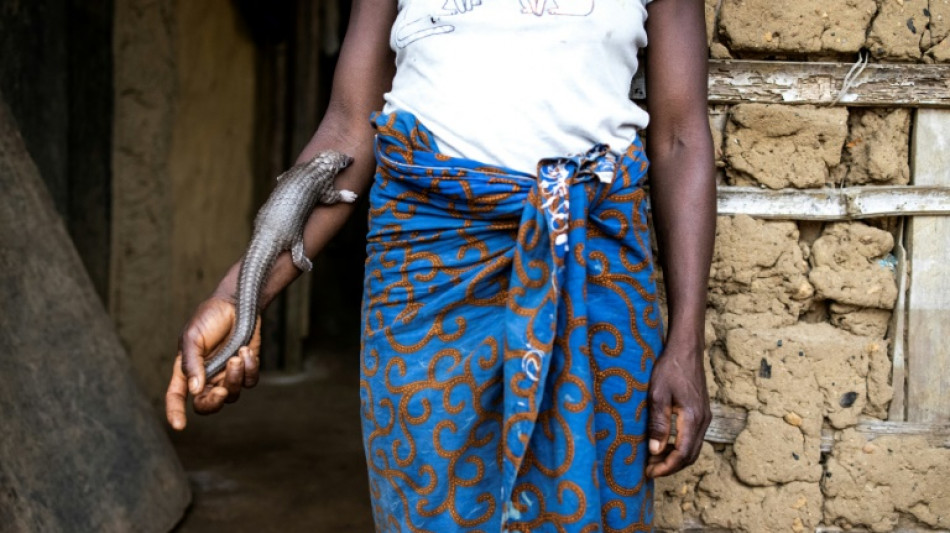
-
 Japan PM's tax giveaway roils markets and worries voters
Japan PM's tax giveaway roils markets and worries voters
-
Amid Ukraine war fallout, fearful Chechen women seek escape route

-
 Rybakina surges into Melbourne semis as Djokovic takes centre stage
Rybakina surges into Melbourne semis as Djokovic takes centre stage
-
Dollar struggles to recover from losses after Trump comments

-
 Greenland blues to Delhi red carpet: EU finds solace in India
Greenland blues to Delhi red carpet: EU finds solace in India
-
Will the EU ban social media for children in 2026?

-
 Netherlands faces 'test case' climate verdict over Caribbean island
Netherlands faces 'test case' climate verdict over Caribbean island
-
Rybakina stuns Swiatek to reach Australian Open semi-finals

-
 US ouster of Maduro nightmare scenario for Kim: N. Korean ex-diplomat
US ouster of Maduro nightmare scenario for Kim: N. Korean ex-diplomat
-
Svitolina credits mental health break for reaching Melbourne semis

-
 Japan's Olympic ice icons inspire new skating generation
Japan's Olympic ice icons inspire new skating generation
-
Safe nowhere: massacre at Mexico football field sows despair

-
 North Korea to soon unveil 'next-stage' nuclear plans, Kim says
North Korea to soon unveil 'next-stage' nuclear plans, Kim says
-
French ex-senator found guilty of drugging lawmaker

-
 US Fed set to pause rate cuts as it defies Trump pressure
US Fed set to pause rate cuts as it defies Trump pressure
-
Sleeping with one eye open: Venezuelans reel from US strikes

-
 Venezuela's acting president says US unfreezing sanctioned funds
Venezuela's acting president says US unfreezing sanctioned funds
-
KPop Demon Hunters star to open Women's Asian Cup

-
 Trump warns of 'bad things' if Republicans lose midterms
Trump warns of 'bad things' if Republicans lose midterms
-
Russian strikes in Ukraine kill 12, target passenger train

-
 With Maduro gone, Venezuelan opposition figure gets back to work
With Maduro gone, Venezuelan opposition figure gets back to work
-
Celebrities call for action against US immigration raids

-
 Rubio to warn Venezuela leader of Maduro's fate if defiant
Rubio to warn Venezuela leader of Maduro's fate if defiant
-
Denver QB Nix 'predisposed' to ankle injury says coach

-
 Lula, Macron push for stronger UN to face Trump 'Board of Peace'
Lula, Macron push for stronger UN to face Trump 'Board of Peace'
-
Prass stunner helps Hoffenheim go third, Leipzig held at Pauli

-
 Swiss Meillard wins final giant slalom before Olympics
Swiss Meillard wins final giant slalom before Olympics
-
CERN chief upbeat on funding for new particle collider

-
 Trump warns US to end support for Iraq if Maliki returns
Trump warns US to end support for Iraq if Maliki returns
-
Judge reopens sexual assault case against goth rocker Marilyn Manson

-
 South Korea's ex-first lady to learn verdict in corruption case
South Korea's ex-first lady to learn verdict in corruption case
-
Rosenior dismisses Chelsea exit for 'untouchable' Palmer

-
 Markram powers South Africa to win over West Indies
Markram powers South Africa to win over West Indies
-
Vladimir Padrino: Venezuela's military power broker

-
 Amazon closing Fresh and Go stores in Whole Foods push
Amazon closing Fresh and Go stores in Whole Foods push
-
Koepka nervous about game and fans in PGA Tour return

-
 Trump's Iowa trip on economy overshadowed by immigration row
Trump's Iowa trip on economy overshadowed by immigration row
-
Dortmund coach says Inter Milan are improved under Chivu

-
 US border chief in Minneapolis as Trump tries to calm crisis
US border chief in Minneapolis as Trump tries to calm crisis
-
What to know about America's colossal winter storm

-
 Iran warns against 'instability' after US strike group arrives
Iran warns against 'instability' after US strike group arrives
-
GM reports quarterly loss but boosts shareholder returns

-
 US banks fight crypto's push into Main Street
US banks fight crypto's push into Main Street
-
NFL Bills make offensive coordinator Brady new head coach

-
 TikTok settles hours before landmark social media addiction trial
TikTok settles hours before landmark social media addiction trial
-
Newcastle braced for 'ultimate test' against PSG after storm disruption

-
 Brook blitz ends Sri Lanka's unbeaten home run, England clinch series
Brook blitz ends Sri Lanka's unbeaten home run, England clinch series
-
LVMH 2025 net profit drops 13% to 10.9 bn euros

-
 Philip Glass pulls Kennedy Center premiere after Trump takeover
Philip Glass pulls Kennedy Center premiere after Trump takeover
-
Slot says Liverpool must fix 'very bad cocktail'


On the front line in Liberia's fight to save the pangolin
Clutching a single-barrelled rifle in lush northern Liberia, Emmanuel says his 10 children were able to get an education thanks to his gun.
The small wiry man, whose full name AFP is withholding, ignores a ban on hunting bushmeat and earns most of his cash catching pangolins or monkeys in the surrounding jungle.
In the dry season, Emmanuel waits for dark and then hikes into the jungle with his rifle and machete.
Pangolins, scale-covered insect-eating mammals that are typically the size of a full-grown cat, are mostly active at night, snuffling through deadwood for ants and termites.
The species is under increasing threat worldwide, but remains a delicacy in the impoverished West African country.
Their scales -- made of keratin, like human nails -- are also prized by consumers abroad for their supposed medicinal properties, fetching much-needed money.
"We kill it, we eat it," said Emmanuel, in a village in Gbarpolu County, five-hours drive north of the capital Monrovia along pitted dirt roads.
"Then the scales, we sell it," added the hunter. "There's no other option".
Believed to be the world's most trafficked animal, pangolins are only found in the wild in Asia and Africa, but their numbers are plummeting under pressure from poaching.
Asian pangolins once met the strong demand in East Asian countries such as China and Vietnam, where the animal's scales are used in traditional concoctions.
But Africa became the major source for the trade from 2013, according to the UN's drugs and crime office UNODC, in a shift likely prompted by falling pangolin numbers in Asia.
- Prime target -
Countries such as Liberia, as well as Nigeria, Cameroon and Guinea, are all origin markets.
Phillip Tem Dia, who works for Flora and Fauna International, a non-governmental organisation in Liberia, said pangolin killings "really, really increased" since the start of the scales trade.
Liberia is a prime target for traffickers. Over 40 percent of the country is covered in rainforest and governance is weak.
It is also still recovering from brutal civil wars from 1989 to 2003, and the 2014-16 Ebola crisis.
With conservationists sounding the alarm, Liberia's government has banned the hunting and sale of pangolins.
But it is battling a generations-old tradition of its impoverished citizens consuming the animal.
Patchy data hampers conservation efforts too. Pangolins are solitary and reclusive, and their number in the wild remains a mystery.
"There are huge gaps in our understanding," said Rebecca Drury, FFI head of wildlife trade.
Available evidence suggests a stark decline in numbers, however.
- 'Staggering' losses -
Known as "ants-bears" in Liberia after their favourite food, pangolins move at a waddle and have no jaws or teeth.
They roll up into a hedgehog-like ball when threatened. Their scales provide protection.
But humans can simply pick pangolins up and carry them off.
"They are very sensitive animals," said Julie Vanassche, the director of Liberia's Libassa Wildlife Sanctuary, near Monrovia, which rehabilitates rescued pangolins.
Many die of stress in captivity, she says, despite round-the-clock care.
The sanctuary has released 42 back into the wild since opening its doors 2017, but the number is likely a drop in the ocean.
A 2020 study by the US Agency for International Development estimated that between 650,000 and 8.5 million pangolins were removed from the wild between 2009 and 2020.
"Either way, the numbers are staggering," the study said, listing deforestation, bushmeat consumption, and the scales trade as reasons behind the decline in pangolins.
According to the UNODC, seizures of pangolin scales have also increased tenfold since 2014, suggesting a booming global trade. In July, China seized two tonnes of smuggled scales, for example.
Vanassche, a Belgian with a pangolin tattoo on her forearm, said the future is "not looking great".
"We need to act very fast -- it's almost over," she said.
- Market raids -
Outside a market in Monrovia, a forestry agent pours gasoline over a pile of confiscated bushmeat, and lights a match.
The mound of dead monkeys, and at least one pangolin, goes up in flames as women gather round to hurl abuse at a dozen agents from Liberia's Forestry Development Authority.
They have just conducted one their first market raids in the capital, after years of raising awareness about wildlife laws.
Liberia banned the sale of bushmeat in 2014 following the Ebola crisis.
In 2016, it also banned the unlicenced hunting of protected species, imposing up to six months in prison or a maximum $5,000 fine on wrongdoers.
The FDA agents -- all tall men who say they are dedicated to stopping the bushmeat trade -- appear to have little sympathy for the market traders, who are all women.
"Our protected species are being killed every day by poachers," said FDA anti-smuggling unit head Edward Appleton, in battledress, adding that the country's natural heritage was threatened.
But Comfort Saah, a market trader, was distraught as her merchandise burned by the roadside. She said she had lost the equivalent of nearly $3,000 in the raid.
The sum is enormous in a country where 44 percent of people survive on under $1.9 a day, according to World Bank figures.
"How are we going to live?" Saah said.
- 'We ate it' -
In rural areas, there are few signs of the government enforcing anti-poaching laws. Pangolin scales were ubiquitous in three villages in northern Gbarpolu County visited by AFP.
Many villagers had small bags stashed in wattle-and-daub homes. Some had sacks full.
"It's not easy to get them. The numbers are going down," said the chief hunter of one village, whose name AFP is withholding, dressed in a black tracksuit.
He explained he hunted because there were no jobs, and didn't understand why the practice was illegal.
Several local hunters said merchants tour the remote villages for scales, but that very few had come last year, suggesting that the pandemic had hampered them.
One young hunter told AFP he had sold scales within the last few months, however.
The product fetches comparatively little: A small plastic bag containing the scales of a couple of pangolins costs a few US dollars, according to several accounts.
The money often goes towards basic necessities such as soap, several said.
A 2020 study by the Netherlands-based Wildlife Justice Commission said that a kilogramme (2.2 pounds) of pangolins scales can sell for $355 in China.
Even during a lull in the scales market, pangolins are hunted for meat.
Matthew Shirley, the co-chair of the pangolin specialist group at the International Union for Conservation of Nature, told AFP it was "totally unrealistic" to expect people living in poverty not to eat protein-rich pangolins.
The focus should be on hunting sustainably, he said.
In one village, a woman named Mamie had a baby pangolin clinging to her body. Her husband had found it in a palm tree with its mother two days prior.
P.Anderson--BTB




